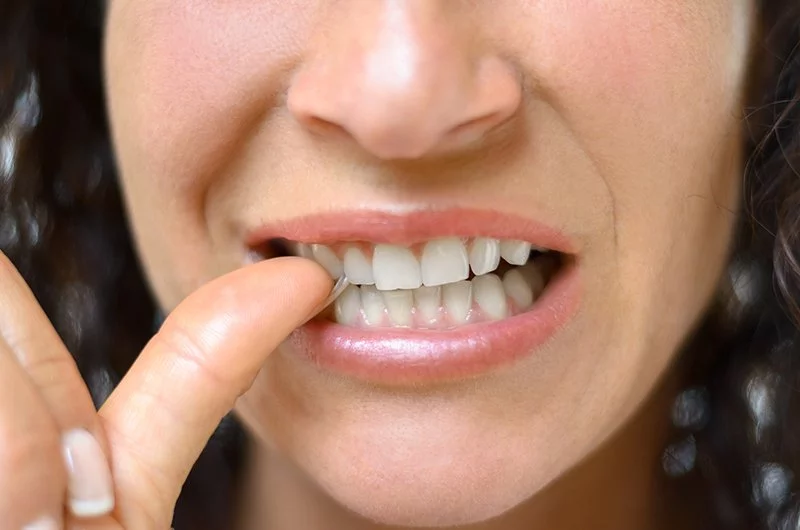
Anyone who has been around babies and toddlers knows that tiny humans use their mouths to learn about their surroundings. For the most part, using our mouths to explore is something that we grow out of, but in some cases oral bad habits and compulsions continue into later childhood or develop in adulthood, which can pose risks to your dental health. Here are a few habits that you should nip in the bud as soon as possible, and some suggestions for how to stop them.
Thumbsucking
When we provide dentistry for children, thumbsucking is one of the bad habits we watch out for. The biggest risk with sustained thumbsucking is how it affects the bite. Frequently having a thumb in the mouth causes teeth to shift around it. This can lead to problems such as an open bite, where the front teeth protrude and cause a large gap between top and bottom teeth, which can affect the function of the teeth while eating and speaking and affect facial aesthetics. Patients with an unaddressed thumbsucking habit that goes on for years usually end up needing orthodontic treatment (braces) that could have been avoided if the habit had been addressed.
The other risk of thumbsucking is that it can introduce bacteria from the fingers into the mouth, which can cause tooth decay. Thumbsucking is considered normal up until age 3. After that point, you should consult with the dentist or your pediatrician to find a solution to stop the habit, such as oral appliances that block the thumb from entering the mouth or thumb shields that are worn on hands.
Biting Your Fingernails
Chewing fingernails is a very common bad habit, but many people don’t know it’s just as bad for the health and appearance of your smile as it is for your hands. The protein that makes up your fingernails may be soft enough to bite through, but it’s actually hard enough that it can cause wear to your teeth over time. As a result, the bottom edges of front teeth start to look ragged or uneven and become more vulnerable to cracks or other damage. Ultimately, chewing fingernails is a compulsive behavior related to stress and is often a habit that people inherit. Luckily, because this habit is so common, there are lots of solutions out there. Try putting a bitter tasting solution on your fingers, occupying your hands with a fidget spinner or something else to fiddle with, occupying your mouth with sugar-free gum, or getting a manicure so there are no tempting rough edges or dry cuticles to gnaw on. If your habit has already caused damage to your teeth, the dentist can assess it and repair it with tooth-colored fillings and bonding to return your smile to it’s original appearance.
Chewing on Ice
This may be one of the worst habits for your dental health. While liquid water is great for flushing debris and bacteria away from your teeth, chewing on frozen water is not that far off from chewing on rocks. Ice can wear out your tooth enamel, making teeth more vulnerable to cracking, tooth decay, and sensitivity to hot and cold. If you have fillings, chewing on ice can make them more brittle and prone to failure. Chewing on ice is like asking for a toothache. Like biting your fingernails, you can cope with your urge to chew by substituting ice for sugar-free gum. If you continue to find yourself tempted, consider not including ice in your beverages.
